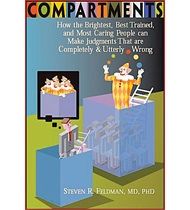- Case-Based Roundtable
- General Dermatology
- Eczema
- Chronic Hand Eczema
- Alopecia
- Aesthetics
- Vitiligo
- COVID-19
- Actinic Keratosis
- Precision Medicine and Biologics
- Rare Disease
- Wound Care
- Rosacea
- Psoriasis
- Psoriatic Arthritis
- Atopic Dermatitis
- Melasma
- NP and PA
- Skin Cancer
- Hidradenitis Suppurativa
- Drug Watch
- Pigmentary Disorders
- Acne
- Pediatric Dermatology
- Practice Management
- Prurigo Nodularis
- Buy-and-Bill
Article
Compartments: Derm’s book examines origins of misunderstanding
How humans misunderstand one another, and the damage that can result, is the theme of a new book, Compartments, by Steven R. Feldman, M.D.
Winston-Salem, N.C. - How humans misunderstand one another, and the damage that can result, is the theme of a new book, Compartments, by Steven R. Feldman, M.D., professor in the departments of dermatology, pathology and public health sciences, Wake Forest University School of Medicine, Winston-Salem, N.C.

New book examines communications processes.Photo: Steven R. Feldman, M.D.
While Dr. Feldman’s 20-plus years of experience as a dermatologist fueled his thoughts for Compartments, the book looks beyond the doctor-patient relationship to broadly examine all relationships and conflict.
Dr. Feldman says that, to start, one has to understand how the world is organized into compartments.
"By that I mean that there are groups of people who are separated by barriers. Barriers can be physical, but they do not necessarily have to be," he says.
"People see themselves as a distinct group. And when that happens, all hell breaks loose. People get very warped impressions about people in other groups,” he says.
What we don’t see
Dr. Feldman says he first saw evidence of the power of misunderstanding in his practice of dermatology.
He cites this example: For years, smart, well-trained, caring academic dermatologists taught their trainees about tachyphylaxis; that the more they used steroids, the less the steroids would work.
"Then, at Wake Forest, we started doing research where we took computer chips and put them in the caps of the medication containers and recorded what patients were actually doing with their medicines,#&34 he says.
"What we found was that patients’ use of topical medication steadily dropped over time. We realized that, typically, the less you used topical steroids, the less they worked," he says. "So, these brilliant, caring, well-trained dermatologists had been teaching their trainees the exact wrong thing for generations.
"It was not because they were mean or evil or stupid, it was because they were drawing a conclusion about a different group of people, about which they did not have firsthand knowledge. They did not know what people were doing in their homes with the medicines."
The message, according to Dr. Feldman, is to be very careful drawing conclusions about other people when you lack firsthand knowledge of what they are like.
Can’t trust it
People in one compartment of life might see things from other compartments and, because those things are not representative of what is “normal” for them, they get a warped impression of what the other group is like.
Dr. Feldman says that, during his 20 years in dermatology, he has seen thousands of patients referred by the family doctor. It is easy, he says, to draw the conclusion that family doctors do not know what they are doing. After all, they send patient after patient who has not responded to treatment or who has gotten worse because of it.
The problem with that thinking, he says, is that dermatologists do not see the majority of patients who do get better and do not have to see a dermatologist.
"This bias is everywhere," he says. "There is a new, over-the-counter wart spray. And I tell you, every patient that I have seen for warts who has tried this spray, the stuff has not cleared up their warts. And some dermatologists wonder why the FDA approved it if it does not work.
"But, of course, in the cases where it works, patients do not come in and see us," Dr. Feldman says.
Your worldview
Dr. Feldman calls it "group think." Within your group, you have a particular way of viewing the world, he says.
"The way the mind works, it does not see objective reality. It always sees things in relationship to the context of the observation. In the talk and in the book, I present the example of visual illusions: how you can have two circles of the same color, but they look different if they are presented surrounded by rectangles of different colors," he says.
As an example, to many dermatologists (one group), the federal IPledge isotretinoin registry was a huge hassle - even insulting. But ask a woman with a severe birth defect or someone who specializes in the management of children with birth defects (two other groups), and that person might say the IPledge campaign is not strict enough.
"What we do know about other groups is in no way representative of what they are really like," Dr. Feldman says.
A universal issue
Misunderstandings among compartments are universal, according to Dr. Feldman.
In the healthcare system, doctors might blame drug companies and insurers for today’s problems. Yet, people working in the pharmaceutical industry or for a major insurance company might have a very different view.
"“We are in compartments, surrounded by borders. We have a way of looking at the world within our compartment," Dr. Feldman says.
"If you just trust your judgment and observation, which you are genetically and evolutionarily programmed to do, you are missing the real world.
"You have to have X-ray eyes to pass the borders of your compartments to understand the world," he says.
Dr. Feldman says he gets into a little trouble when he takes these thoughts and applies them to politics, religion and broad conflict. As a Jewish child growing up in Washington, D.C., he says, he learned about Muslims from fellow Jews.
"These were caring, well-trained teachers in my Jewish school. They were not evil. They just didn’t know what Muslims were like, because they were not Muslim," he says.
Making the effort
Dr. Feldman says he has grown sensitive to drawing conclusions based only on what he knows and observes. It takes effort, he says, to realize the potential for misunderstanding to develop, related to compartments. But the results are well worth the effort.
There are compartments within groups, he says. After all, even dermatologists listening to his 2006 lecture on the topic at the American Academy of Dermatology annual meeting had diametrically opposite perceptions of the talk.
"People can look at one objective reality and, based on the context they bring to it, perceive totally different things,” he writes.
"Misunderstanding is built into the way our world is organized and structured. The compartments in which the world is organized are a feeding ground for misunderstandings that result in conflict. A world full of good people can still be a world troubled by conflict." DT
For more information:





